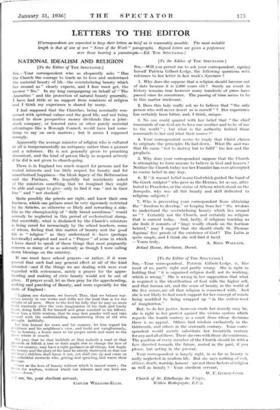LETTERS TO THE EDITOR
(Correspondents are requested to keep their letters as brief as is reasonably possible. The most suitable length is that of one of our " News of the Week" paragraphs. Signed letters are given a preference over those bearing a pseudonym.ŌĆöEd. Tim Sexersron.f
SIR,ŌĆöYour correspondent who so eloquently asks " Has the Church the courage to teach us to love and understand the material beauty of lifeŌĆöthe overwhelming beauty which lies around us " clearly expects, and I fear must get, the answer " No." In my long campaigning on behalf of " The Amenities " and the protection of natural beauty generally, 1 have had little or no support from ministers of religion and I think my experience is shared by. many.
I had supposed that the Churches, being nominally con- cerned with spiritual values and the good life, and not being bound to show prospective money dividends like a joint- stock company, or lowered rates or other purely material advantages like a Borough Council, would have had some- thing to say on such matters; but it seems I supposed wrongly.
Apparently the average minister of religion who is cultured et all is temperamentally an antiquary rather than a pioneer and a reformer. He is not generally given to preaching discontent, and the kind of person likely to respond actively if he did is not given to church-going.
There is in England too much respect for. persons and for vested interests and too little respect for beauty and for unauthorised happinessŌĆöthe bleak legacy of the Reformation and the Puritans. We hopefully but mistakenly asked of the ministers something that we imagined they might be able and eager. to. giveŌĆöonly to find it was " not in their
line ", and. " not stocked." ,
Quite possibly the priests are right, and know their own business, which one gathers must be very rigorously restricted by its. Articles, as otherwise so likely and rewarding a side- line as the championship of " daily bread seemliness " would scarcely be neglected in this period of ecclesiastical slump. But mercifully, what is disdained by the Church's ministers is. being cared for increasingly by the school teachers, some of whom, feeling that this matter of beauty and the good life is " religion " as they understand itŌĆöhave (perhaps heretically) adopted and used a " Prayer " of mine in which I.have dared to speak of those things that most poignantly concern- so many of us as solemnly as though I were calling down 'blessings on the ministry.
If one must have school prayersŌĆöor rather, if it were proved that such had any general effect at all of the kind intendedŌĆöand if the things we are dealing with were ever regarded with seriousness, surely a prayer for the appre- hending and making of civic beauty would not be out of place. If prayer avail, let us then pray for the apprehending, making and guarding of Beauty, and more especially for the
state of England : ŌĆó
" Lighten our darkness, we beseech Thee, that we behave our- selves seemly in our works and defile not the land that is for the delight of all men. Show to the fool his folly that he may no more Wild wantonly after the vain imagination of his dark and lonely heart, doing both it for himself and great mischief to his fellows. now him a little wisdom, that he may that ponder well and take counsel with the understanding, remembering them of old who wrought faithfully.
Let him honour his town and his country, let him regard his neighbour and his neighbour's view, and build not vaingloriously, but in honesty, a house meet to his proper needs and meet to the Fthwe where It stands.
We pray that he that buildeth or that maketh a road or that Plsntoth or felleth a tree or doth aught else to change the face of this our country, may have a right guidance in all things, lest haply the beauty and the glory of the land be utterly destroyed, so that our children's children shall know it not, yet shall rise up and curse us for unfaithful stewards who, getting and spending, laid waste their heritage.
Grant us the love of beauty without which it cannot come ; the desire for wisdom, without which our labours and our love are ŌĆó ";11. ŌĆöAmen."
am, Sir, your obedient servant, CLOUGH WILLIAMS-ELLIS.










































 Previous page
Previous page